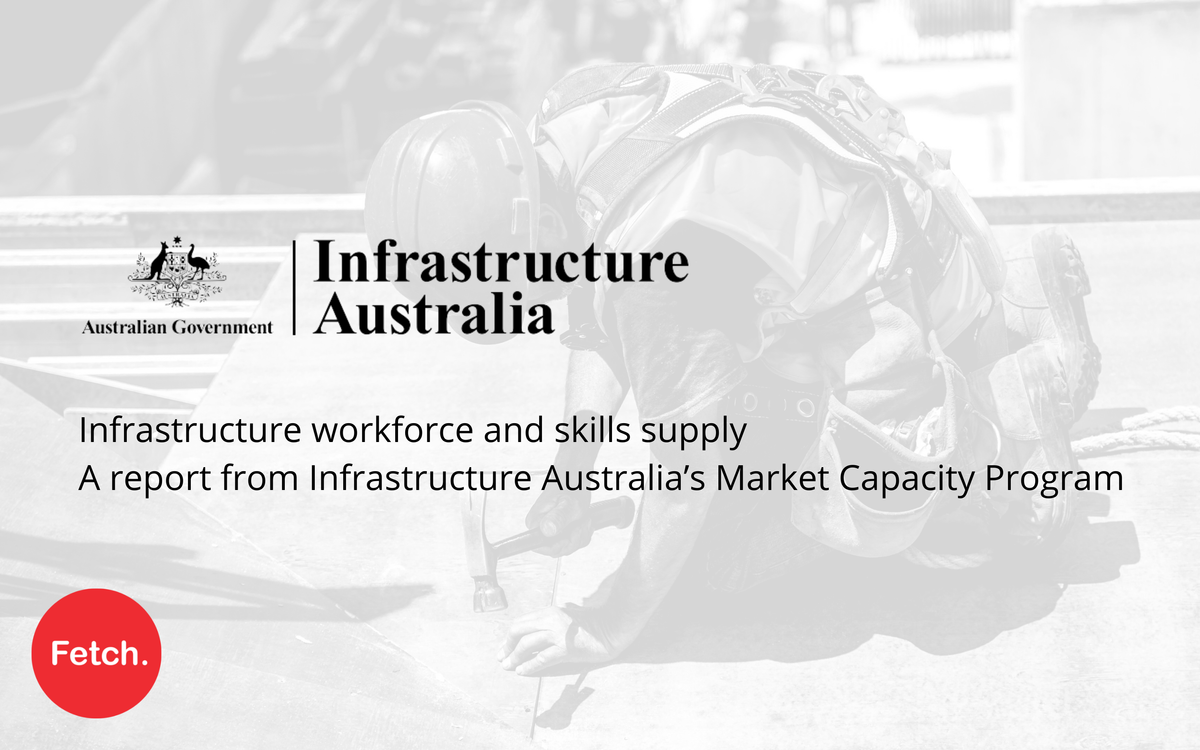Connecting...
Infrastructure Workforce & Skills Supply Update: What this means for Civil Trades & Labour
Published date: 2021/10

After reviewing the recent report from Infrastructure Australia’s Market Capacity Programme it’s daunting to think the skills shortage is projected to continue over the next 7 years.
It states that over the next 3 years labour will be in high demand and is predicted to reach unprecedented levels. Labour shortages are anticipated to be 3 times greater than in 2017-2018, peaking at a likely shortfall of 93,000 workers in early 2023 or 48% higher than projected supply.
To fulfill this demand, we would require growth of 25% per year over the next two years, which is more than eight times higher than the projected growth rate of 3.3% p.a. over the same period.
There are also concerns over early retirement for up to 40% of the workforce over the next 15 years - as well as labour mobility and gender disparity.
Some Key Takeaways:
- Australia’s currently planned infrastructure will extend the present infrastructure boom to 2025. The workforce is already exhibiting signs of strain as projects commence.
- Shortages are expected to last until at least 2024 based on currently confirmed projects that are primarily focused over the forward estimates. Even if the shortages do not cause delays on projects, the workforce challenges will likely extend further as new projects are confirmed. A conservative estimate shows this could extend out till 2028.
- As overall labour shortages persist, specific occupation shortages will become more acute. Between 2021 and 2024 shortages are anticipated in all four key occupational groupings but are likely greatest amongst engineers (multiple) and general construction labour.
- Road and civil based plant operators, drillers, safety officers, telecommunication field staff and electrical line workers are other occupations with strong likelihood of nationwide shortage.
- Shortages are anticipated to peak at 19,000 project management professionals, 70,000 engineers, scientists, and architects, 15,000, structural and civil trades and labour and 14,000 finishing trades and labour at different points across the next three years.

Image Source: Infrastructure Workforce and Skills Supply
- The public infrastructure sector is facing an ageing workforce with over 40% of the total workforce with potential to retire in the next 15 years. At the same time regulatory and procurement practices result in workforce inefficiencies that the sector cannot afford as it copes with escalating demand.
The sector needs to grow its workforce. However, a range of cultural, geographical, diversity and education issues constrain the sectors’ ability to rapidly grow its workforce
Potential Solutions:
Migration
We need to focus on attracting workers to the state. The International Visitor Survey by the Department of Immigration and Border Protection and Tourism Research Australia reported that 121,000 working holiday makers arrived in Australia every year as of December 2016, including 57,000 from the UK, 35,200 from Korea, and 33,600 from Germany. With international boarders set to open late 2021/early 2022 working holiday makers can migrate to Melbourne where it had previously been ranked by the EIU as the World's Most Liveable City for 7 years in a row, from 2011 to 2017.
Development
However, migration will only account for a percentage of workers that the market demands over the next 7 years. Which is why Fetch are continuously seeking ways to further equip our current workforce, especially in times like these. We decided that partnering with NSI – National Skills Institute to deliver onsite Cert 3 Civil apprenticeships, upskilling our best labourers to become qualified plant operators & leading hands can help alleviate some of the pressure and offer staff genuine career opportunities whilst becoming better assets to their companies.
Retention
Recent seek data suggests that job security & work life balance are the most important criteria for candidates post COVID. Offering a higher salary may not be enough anymore. Therefore, we have implemented an agreement with our clients that should a candidate be fulfilling their role and both parties are happy, the client can offer a permanent role to the candidate (normally after a 3–6-month trial period).
Freedom
It’s safe to say we are still adapting to the new norm as well as trying our best to keep projects in-line and ahead of schedule. It’s worth noting that by the time the curbs are lifted, the city of five million people will have been under six lockdowns totalling 262 days since March 2020 Australian and other media say this is the longest in the world, exceeding a 234-day lockdown in Buenos Aires. However, with restrictions easing in the coming weeks and summer being right around the corner, we hope returning to somewhat normal life and a well needed boost to the economy will inspire people, lift spirits, and re-ignite their passion within the workforce.
As a specialist, construction recruitment company we are constantly receiving new information such as project updates, market trends, tender reports, available candidates etc, which we feel can be of benefit to everyone if shared.
Although we are experiencing a shortage of skilled workers in the current market, at Fetch we have access to 60,000+ experienced candidates and have collaborated with several leading businesses on a diverse range of projects within civil construction.
Our experience for supplying labour hire ranges from pre-construct stage all the way through to maintenance on a magnitude of projects across Victoria.
If you would like to discuss how we can partner on your upcoming projects, or for more information on the projects we have successfully partnered with, please contact me, a Senior Consultant working within Civil Trades, on Leo.clatworthy@fetchrecruit.com.au or via LinkedIn.
Lastly, if you have any immediate labour requirements, please call me on 0420 958 825.
